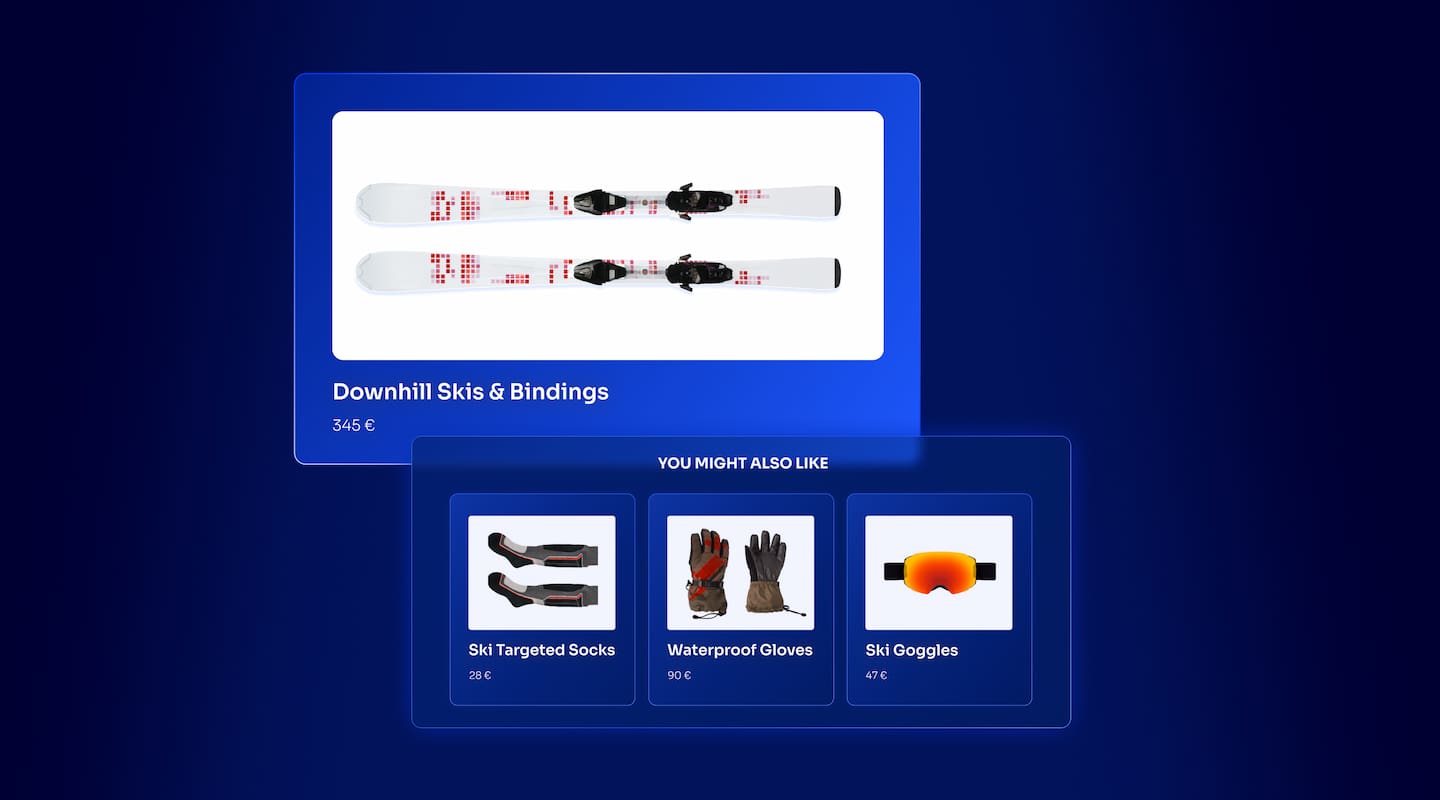Add InstantSearch and Autocomplete to your search experience in just 5 minutes
A good starting point for building a comprehensive search experience is a straightforward app template. When crafting your application’s ...
Senior Product Manager


A good starting point for building a comprehensive search experience is a straightforward app template. When crafting your application’s ...
Senior Product Manager

The inviting ecommerce website template that balances bright colors with plenty of white space. The stylized fonts for the headers ...
Search and Discovery writer

Imagine an online shopping experience designed to reflect your unique consumer needs and preferences — a digital world shaped completely around ...
Senior Digital Marketing Manager, SEO

Winter is here for those in the northern hemisphere, with thoughts drifting toward cozy blankets and mulled wine. But before ...
Sr. Developer Relations Engineer

What if there were a way to persuade shoppers who find your ecommerce site, ultimately making it to a product ...
Senior Digital Marketing Manager, SEO

This year a bunch of our engineers from our Sydney office attended GopherCon AU at University of Technology, Sydney, in ...
David Howden &
James Kozianski

Second only to personalization, conversational commerce has been a hot topic of conversation (pun intended) amongst retailers for the better ...
Principal, Klein4Retail

Algolia’s Recommend complements site search and discovery. As customers browse or search your site, dynamic recommendations encourage customers to ...
Frontend Engineer

Winter is coming, along with a bunch of houseguests. You want to replace your battered old sofa — after all, the ...
Search and Discovery writer

Search is a very complex problem Search is a complex problem that is hard to customize to a particular use ...
Co-founder & former CTO at Algolia

2%. That’s the average conversion rate for an online store. Unless you’re performing at Amazon’s promoted products ...
Senior Digital Marketing Manager, SEO

What’s a vector database? And how different is it than a regular-old traditional relational database? If you’re ...
Search and Discovery writer

How do you measure the success of a new feature? How do you test the impact? There are different ways ...
Senior Software Engineer

Algolia's advanced search capabilities pair seamlessly with iOS or Android Apps when using FlutterFlow. App development and search design ...
Sr. Developer Relations Engineer

In the midst of the Black Friday shopping frenzy, Algolia soared to new heights, setting new records and delivering an ...
Chief Executive Officer and Board Member at Algolia

When was your last online shopping trip, and how did it go? For consumers, it’s becoming arguably tougher to ...
Senior Digital Marketing Manager, SEO

Have you put your blood, sweat, and tears into perfecting your online store, only to see your conversion rates stuck ...
Senior Digital Marketing Manager, SEO

“Hello, how can I help you today?” This has to be the most tired, but nevertheless tried-and-true ...
Search and Discovery writer
You say “sweats”, someone else say “joggers”.
He says “fifth wheel”, she says “camper”, your neighbor says “RV”.
Some people call movie stars “wealthy”; others describe them as “rich”.
The English language has evolved in interesting ways along with different groups of people’s lexicons so that we now have a wealth (richness?) of similar words and phrases — synonyms — to use as communication options. Plus, some of our words (for example, “mouse”) mean two entirely different things altogether.
The ambiguity caused by this phenomenon can be a problem, such as when computer science gets involved. Through people’s use of natural language and unique words, massive amounts of information and collections of documents are created and shared every day: research studies, emails, school work, web pages, social media posts, blog posts, call transcripts, news stories, search queries. And in addition to creation of new documents, there’s plenty of editing of old ones.
Thanks to natural language processing (NLP), the language nuances various people are using and expecting to hear can be turned into information that software can more easily figure out and use or apply “intelligently.”
Website and app search, in particular, benefit from top-notch NLP technology. After all, if someone is searching for “tights” on an ecommerce website where they’re only referred to as “leggings”, and the search engine hasn’t been apprised that these terms are used interchangeably, or differently by different geographically based groups, the shopper using the wrong search term is likely to be out of luck.
Fortunately, we have latent semantic indexing (LSI; also called latent semantic analysis or LSA for short), developed for creating vectors and performing information retrieval. This technical method of doing NLP utilizes a mathematical technique called singular value decomposition (SVD), which looks for relationships between concepts and words in unstructured data.
LSA analyzes relationships between documents and the terms they contain by reducing the number of dimensions. It’s good at understanding document relatedness by analyzing which terms are often used together — for example, “royalty” and “queen” — as a prelude to building a model of semantic relatedness.
LSI isn’t a new thing. Way before the Internet came on the scene — in the early days, the 1980s — this statistical model was developed to facilitate text matching. It’s a patented technology (Bell Communications Research). One of its major uses then was helping search engines understand relationships between concepts and words in order to provide people with the most relevant search results for their search queries. And although the patent expired in 2008, it’s still going strong in the world of data science.
For enhancing search, it’s still being tapped for upgrading the search functionality on sites and apps. How the technology works is a bit complex, but suffice it to say that it’s related to creating vectors and performing information retrieval despite people entering “alternative” words to those housed in the site’s or app’s index. The benefit is its ability to help people find whatever piece of content they want faster, leading to both happier searchers and better metrics and revenues for organizations and businesses.
You may have heard the term “LSI keywords” used in relation to Google search and search engine optimization (SEO) strategy. If so, you’re in good company, but we must temporarily digress.
According to Google senior search analyst John Mueller, “LSI keywords” aren’t a viable thing (nor are things like “LSI keyword suggestions”, the act of “finding LSI keywords”, or plans to “use LSI keyword generators” or set up a Google keyword planner), at least in the context of Google-related keywords and SEO tools.
Search Engine Journal’s Roger Montti notes that the myth of Google using LSI keywords may stem from use of such phrases as “‘Semantic Analysis,’ ‘Semantic Indexing’ and ‘Semantic Search’ having become SEO buzzwords, given life by Ask Jeeves’ semantic search technology and Google’s purchase of semantic analysis company Applied Semantics.” SEO guru Bill Slawski goes into depth in a blog post.
Good to know. But this Google situation aside, LSI is still a relevant concept in the world of search. Broadly speaking, LSI keywords are search terms related to the main keyword you are targeting. They help to support your content and add more context to make it easier for both search engines and users to understand what your content is about.
Therefore, they are critical considerations, and are still something to think seriously about if you want an effective website or content marketing that works. Semantic search is a viable undertaking that has ramifications in terms of adding search functionality to a company’s site or app.
To return accurate search results, search engine retrieval methods must be able to effectively “understand” and deal with synonyms, those pesky words and phrases that, through no fault of their own, have the same meaning as other words and phrases.
Synonyms certainly aren’t a rarity. Even in just a single industry, like retail, they abound because of the diverse ways in which different groups of people, such as those with different dialects, thinking about items in different contexts — or natives of different countries — refer to the same item or idea.
It happens more than you might think. A searcher on a clothing seller’s ecommerce store site might naturally think to enter a search query for a:
Some of these terms are victims of overuse; others are considered odd by conventional standards because only certain age groups use them, for instance. Regardless of the wide synonymy abyss, a search engine must intimately know them all.
Table, mouse, sharp…these are all polysems — words with more than one meaning. And as is the case with synonyms, with polysemy, getting a search engine to confidently understand which version you’re referring to is key.
In terms of digital marketing, if a shopper can’t pull up a great results page for what they need, that’s a pressing problem. If you can’t suggest relevant related searches when a shopper gets no helpful results for their main keyword, that’s a big red flag. For online business success, every synonym must be accounted for; every related term known, every possible semantically related word or phrase duly anticipated.
Does this linguistically challenging situation stump the average modern search engine?
Not with LSI in the semantic search picture. By statistically analyzing words that appear in a text document, it can anticipate which of the synonymous word different meanings is being queried and respond with the most accurate search engine results page (SERP). And when it comes to polysemy, it can tell which version of the word the searcher wants.
At Algolia, this type of semantic search technology falls in the realm of vector search. Using machine learning models that detect semantic relationships between objects in an index, it finds related objects that have similar characteristics. (Here’s some background on how cosine similarity determines closeness in word meaning). Vector embeddings (also known as “word embeddings” or just “vectors”) are applied, along with spelling correction, language processing, and category matching.
Artificial intelligence (AI) models powered by vector engines can instantly retrieve accurate information. They can figure out that words and phrases like “gardening” and “yard work” are related words. They know that someone searching for “Puma” is looking for athletic shoes as their relevant content, not a large wildcat. “They can quickly break through the limits of exact keyword matching and immediately deliver optimal, relevant results.
Our search solution combines this AI-based vector-space functionality with traditional keyword search to offer true hybrid search, covering all the bases. By applying full-text keyword search and vector search to each query, searchers get super accurate results, and fast.
If you’ve been wanting to ensure that your users or shoppers get the absolute right search results, feel understood in their information quests, and have an excellent user experience regardless of the specific keywords they initially enter in the search bar, you’re in the right place.
There’s an added bonus, too: upgrading your search functionality could lead to surprising improvements in your conversions; just ask our clients, who know this firsthand.
Sign up for a free demo or let us know when you’re ready to learn more.
Senior Digital Marketing Manager, SEO
Powered by Algolia Recommend